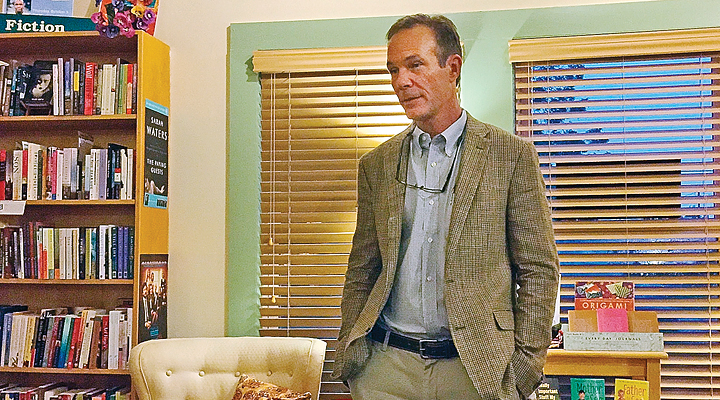Stormy weather didn’t stop local author Joel Bourne from discussing his newly released book, “The End of Plenty: The Race to Feed a Crowded World” at Pomegranate Books Thursday, June 18.
“It’s so wonderful to be here,” Bourne said. “I’ve been working on this for about five years, since I got an assignment to do a story on this topic in 2009 for National Geographic.”
Bourne said growing up on a family farm in Tarboro, N.C., fostered his enthusiasm for farming.
“My evolution from would-be farmer to journalist shaped my view of the world,” he said.
Bourne continued to address the subject of his book: global food shortage.
“What I view as one of the biggest challenges humanity is facing right now is the ability to feed everyone by the middle of this century with climate change suppressing yields and causing havoc all around the world,” he said.
Bourne also discussed the work of Thomas Malthus, a Cambridge University mathematician who studied the correlation between population increase and food production.
“Reverend Malthus talked about how easy it is for population to outrun food supply, and now we’re at this curious inflection point where our population is set to get to 9.6 billion by 2050 and continue rising to almost 11 billion by 2100,” he said. “In order to feed that many people, just to keep the status quo — and we now still have 800 million people that are hungry in the world — agricultural experts say we have to double food production in the next 25 years. … That means we have to grow more food in the next 25 years than we’ve grown in the last 10,000. It’s a phenomenal task, and we have to do it without devastating the lands, the forests and the oceans that sustain us.”
Bourne said food shortage has caused many of the world’s political crises.
“The crisis in Syria was the result of a year-long drought that caused food prices to rise and food insecurity in that region,” he explained. “The whole Arab Spring was preceded by a year of high inflation and food prices. Going back, Tiananmen Square was preceded by a year of high food inflation and pork rationing that made rural people extremely angry with the government. … A lot of people in the world make $2 per day and spend 60 percent of their income on food.”
Bourne said global climate change will dramatically impact food production.
“A few years ago, I saw a study from the Royal Society in Great Britain. … They said, basically, if global average temperatures get to a 4-degree Celsius increase, it could make half of our agricultural land no longer suitable for farming,” he said.
Despite the grim issues Bourne discussed, he also presented potential solutions.
“In the last half of the book, I’ve got a couple of solutions that I think might help us out. Some of them might increase productions, like aquaculture. … Others are ways we can reduce consumption — eating less meat is a good one, one thing my family tries to do,” he said.
Bourne said educating women in developing countries, and providing them with agricultural technology, will help solve the global shortage problem.
“We really need to ferment a pink revolution in half the world,” he said. “Women produce most of the food in Africa. If we just give them the technology, we can increase agricultural production in Africa by 30 percent overnight.”
email [email protected]




